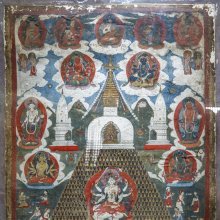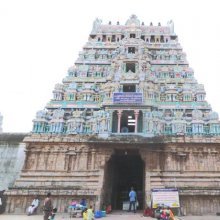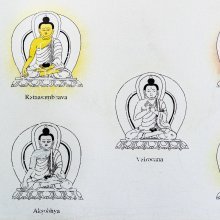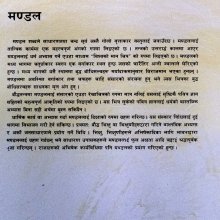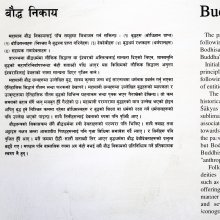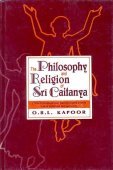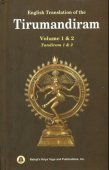Svarupa, Svarūpa, Sva-rupa: 31 definitions
Introduction:
Svarupa means something in Hinduism, Sanskrit, Jainism, Prakrit, the history of ancient India, Marathi, Hindi, biology. If you want to know the exact meaning, history, etymology or English translation of this term then check out the descriptions on this page. Add your comment or reference to a book if you want to contribute to this summary article.
Svarupa has 31 English definitions available.
Alternative spellings of this word include Swarup.
Images (photo gallery)
(+1 more images available)
Languages of India and abroad
Sanskrit dictionary
[Deutsch Wörterbuch]
Source: Cologne Digital Sanskrit Dictionaries: Böhtlingk and Roth Grosses Petersburger WörterbuchSvarūpa (स्वरूप):—
1) n. am Ende eines adj. comp. f. ā . a) die eigene Gestalt, - Form: dhārin [Mahābhārata 3, 2620.] svarūpaṃ divyamāsthāya [11977. 5, 7537. 12, 4270.] viṣṇu Viṣṇu’s Gestalt [Pañcatantra ed. orn. 54, 16.] [Bhāgavatapurāṇa 1, 9, 39.] vyavasthānaṃ taḥ [2, 8, 22. 3, 2, 15.] yajñasvarūpadhṛk [4, 1, 4.] stha [?23, 18. 6, 8, 31 (pl.).] śabdasya Lautform [Scholiast] zu [Pāṇini’s acht Bücher 1, 1, 68.] śabda zu [39. 2, 2, 34.] svarūpam, paryāyāḥ, viśeṣāḥ das Wort selbst, die Synonyme, die Unterarten (Species) [Siddhāntakaumudī] zu [4,35.] am Ende eines adj. comp.: strī in weiblicher Gestalt [Mahābhārata 5, 7531.] a gestaltlos (Gegens. rūpavant) [Bhāgavatapurāṇa 2, 6, 44.] — b) die eigene Beschaffenheit, Eigenthümlichkeit, Wesen, Natur, Charakter [Amarakoṣa 1, 1, 7, 38. 3, 4, 26, 204.] [Trikāṇḍaśeṣa 3, 3, 145.] [Halāyudha 5, 78.] nāmnāṃ svarūpabhāvo hi bhobhāva ṛṣibhiḥ smṛtaḥ so v. a. bhos gilt ja gerade dasselbe wie der eigentliche Name [Manu’s Gesetzbuch.2,124.] [Yogasūtra.1,3.2,23. 54.] [Oxforder Handschriften 231,b,2. 21.] [Spr.] [?(II)2165. 6420. Varāhamihira’s Bṛhajjātaka S. 32,16. 47,3. Kathāsaritsāgara 18,215. 20,103. 24,157. 48,77. 111,87. 120,86. Mārkāṇḍeyapurāṇa 34,9. 51,90. 68,3. Sāhityadarpana 2. PRATĀPAR.3,b,6. Bhāgavatapurāṇa.3,28,37.7,9,20. Pañcatantra 43,12. 137,19. 145,16. 233,11. ed. orn. 19,4. Hitopadeśa 98,13. 113,13. morgenländischen Gesellschaft 14,572,5. Hemacandra Yogaśāstra.4,52.] svasvarūpa 45. paṭha kiṃcitkālasvarūpam [Vetālapañcaviṃśati] in [Lassen’s Anthologie (III) 29, 18.] [Madhusūdanasarasvatī’s Prasthānabheda] in [Weber’s Indische Studien 1, 14, 3.] Comm. zu [Taittirīyasaṃhitā Prātiśākhya 21, 10. 15. 24, 4.] [SARVADARŚANAS. 31, 21. 34, 8. 17. 47, 15. fgg. 60, 9. 99, 12. 17. 169, 13. 174, 11. 180, 3.] tas [Mārkāṇḍeyapurāṇa 73, 3.] svarūpamahātman so v. a. von Natur [134, 8.] svarūpāsiddha so v. a. in sich als falsch sich erweisend (z. B. der Laut ist eine Eigenschaft, weil man ihn sieht) [TARKAS. 43. fg.] am Ende eines adj. comp.: pūrva [Prātiśākhya zum Ṛgveda 6, 11.] brahma (so lesen wir) [NṚS. TĀP. Upakośā] in [Weber’s Indische Studien 9, 76.] abāhya [163.] [PAÑCAR. 2, 3, 51. 4, 5.] [SARVADARŚANAS. 174. 13.] —
3) adj. = budha und manojña (vgl. abhirūpa, prāptarūpa und surūpa) [Amarakoṣa 3, 4, 19, 134.] fehlerhaft für sarūpa (so [WILSON][?’s Ausg.]) [SĀṂKHYAK. 8.] für surūpa [Vetālapañcaviṃśati] in [Lassen’s Anthologie (III) 16, 14.] —
4) m. Nomen proprium eines Daitya [Mahābhārata 2, 366.] eines Sohnes der Sunandā [Mārkāṇḍeyapurāṇa 118, 2.] eines Schülers des Caitanya [WILSON, Sel. Works 1, 155.] —
5) Nomen proprium einer Oertlichkeit (vgl. svārūpa) [Oxforder Handschriften 338,b,22.] — Vgl. nīla, vidhisvarūpavādārtha, śrī .
--- OR ---
Svārūpā (स्वारूपा):—f. Nomen proprium einer Oertlichkeit [Oxforder Handschriften 339,b,37.] — Vgl. svarūpā .
Sanskrit, also spelled संस्कृतम् (saṃskṛtam), is an ancient language of India commonly seen as the grandmother of the Indo-European language family (even English!). Closely allied with Prakrit and Pali, Sanskrit is more exhaustive in both grammar and terms and has the most extensive collection of literature in the world, greatly surpassing its sister-languages Greek and Latin.
See also (Relevant definitions)
Starts with (+27): Shvarupadharin, Svarupa acarya, Svarupabodhaka, Svarupacarya, Svarupadeha, Svarupagata, Svarupagrahana, Svarupaguna, Svarupagunana, Svarupajna, Svarupajnana, Svarupaka, Svarupakara, Svarupakhyastotra, Svarupalakshana, Svarupam, Svarupanandamunindra, Svarupanirnaya, Svarupanirupana, Svarupanugata.
Ends with (+65): Agnisvarupa, Anamdasvarupa, Annasvarupa, Anubhutisvarupa, Astrasvarupa, Asvarupa, Atmasvarupa, Badarasvarupa, Bhagavatsvarupa, Bharativishvarupa, Bhinnasvarupa, Bijaksharasvarupa, Brahmasvarupa, Cakradanasvarupa, Caturvidhasvarupa, Cetahsvarupa, Chakradanasvarupa, Chitsvarupa, Citsvarupa, Dharataliya-svarupa.
Full-text (+162): Svarupata, Svarupagata, Svarupasiddhi, Svarupam, Brahmasvarupa, Svarupatva, Kalasvarupa, Bhutabhavana, Asvarupa, Svarupasambodhana, Svarupanirnaya, Svarupanirupana, Svarupaprakasha, Svarupasambandharupa, Svarupavat, Svarupasambodhanapancavimshativritti, Svasvarupa, Citsvarupa, Vishnusvarupadhyanadivarnana, Svarupanusamdhana.
Relevant text
Search found 96 books and stories containing Svarupa, Sva-rupa, Sva-rūpa, Sva-rūpā, Svarūpa, Svarūpā, Svārūpā; (plurals include: Svarupas, rupas, rūpas, rūpās, Svarūpas, Svarūpās, Svārūpās). You can also click to the full overview containing English textual excerpts. Below are direct links for the most relevant articles:
Bhakti-rasamrta-sindhu (by Śrīla Rūpa Gosvāmī)
Verse 2.1.19 < [Part 1 - Ecstatic Excitants (vibhāva)]
Verse 2.1.180 < [Part 1 - Ecstatic Excitants (vibhāva)]
Verse 2.1.305 < [Part 1 - Ecstatic Excitants (vibhāva)]
Shrimad Bhagavad-gita (by Narayana Gosvami)
Verse 10.37 < [Chapter 10 - Vibhūti-yoga (appreciating the opulences of the Supreme Lord)]
Verse 13.5 < [Chapter 13 - Prakṛti-puruṣa-vibhāga-yoga]
Verse 4.6 < [Chapter 4 - Jñāna-Yoga (Yoga through Transcendental Knowledge)]
Garga Samhita (English) (by Danavir Goswami)
Verse 6.2.22 < [Chapter 2 - Residence in Śrī Dvārakā]
Verse 6.21.33 < [Chapter 21 - In the Description of the Third Fort, the Glories of Piṇḍāraka-tīrtha]
Verses 5.24.71-73 < [Chapter 24 - The Killing of the Kola Demon]
Brihad Bhagavatamrita (commentary) (by Śrī Śrīmad Bhaktivedānta Nārāyana Gosvāmī Mahārāja)
Verse 2.2.189 < [Chapter 2 - Jñāna (knowledge)]
Verse 2.2.176 < [Chapter 2 - Jñāna (knowledge)]
Verse 1.3.73 < [Chapter 3 - Prapañcātīta (beyond the Material Plane)]
Vakyapadiya of Bhartrihari (by K. A. Subramania Iyer)
Verse 1.57 < [Book 1 - Brahma-kāṇḍa (or Āgama-samuccaya)]
Verse 2.416 < [Book 2 - Vākya-kāṇḍa]
Verse 2.256 < [Book 2 - Vākya-kāṇḍa]
Bhajana-Rahasya (by Srila Bhaktivinoda Thakura Mahasaya)
Related products
